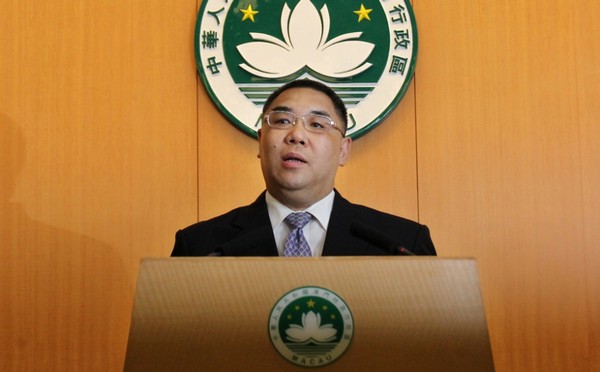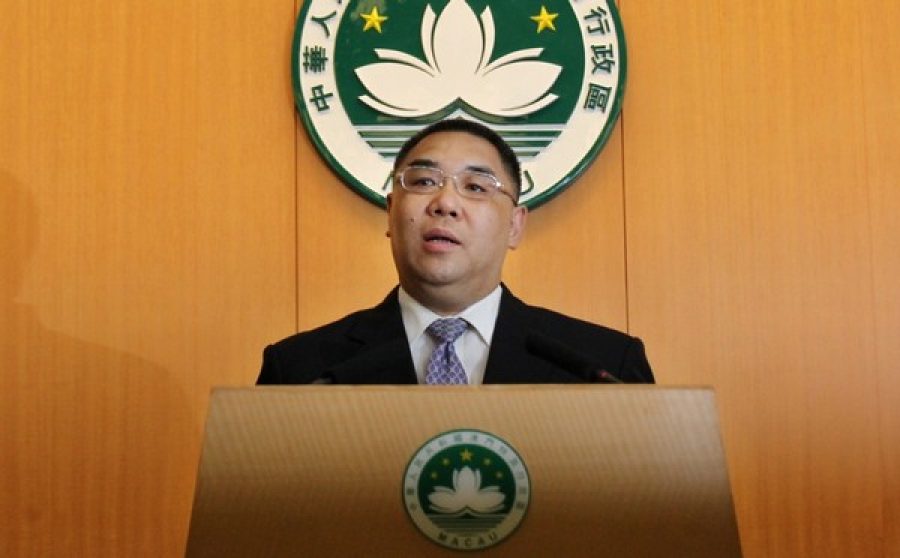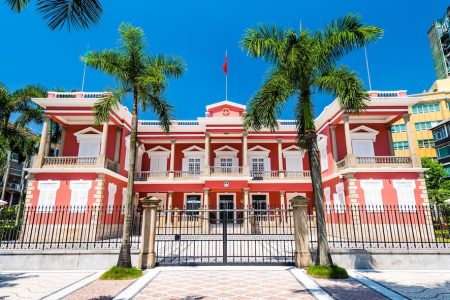A total of 4,505 of 5,448 voters representing several hundred associations elected 344 members of the 400-head Chief Executive Election Commission among 352 candidates – just eight more than the number of seats available.
Turnout was 82.69 percent. Some 94 percent of the votes cast were valid, with 70 ballots left blank and 198 deemed invalid, according to an initial result released by the Chief Executive Electoral Management Committee yesterday.
Voting was from 9 a.m. to 6 p.m. in seven polling stations – three in Tap Seac Multi-Sports Pavilion, one in Sir Robert Ho Tung Luso-Chinese Primary School near Tap Seac Square, one in the Macau Polytechnic Institute’s Sports Stadium in Zape and two in Kao Ip Middle School in Nape.
Addressing a press conference in the Public Administration Building, Song Man Lei, one of the three Court of Final Appeal (TUI) judges, who chairs the government-appointed committee, said that the voting turnout meant that the election was “recognized” by the public.
Chui’s current five-year term will end at midnight on December 19. Macau’s chief executive can only serve two consecutive five-year terms.
Early this year, Chui told the media that he would seek re-election and that he would make his official announcement on his decision regarding the matter at an “appropriate time”. After Chui’s announcement, many associations which had the right to vote yesterday expressed their support of Chui.
The chief executive election by the 400-member is scheduled to be held on August 31, government broadcaster TDM’s Portuguese TV channel reported yesterday.
According to official figures provided by the Public Administration and Civil Service Bureau (SAFP), 825 associations comprising 99 from the manufacturing, commerce and finance sector, 137 from the culture sector, 313 from the sports sector, 132 from the social service sector and the remaining from the education, professionals and labour sectors, which have at least 22 votes each, were allowed to elect 344 members of the commission.
The commission comprises 400 members, including 120 elected from the manufacturing, commercial and financial sector, 26 from the culture sector, 29 from the education sector, 43 from the professional sector, 17 from the sport sector, 59 from the labour sector, 59 from social services, six from the religious sector, and 22 from the Macau Legislative Assembly (AL), as well as 12 local deputies to the National People’s Congress (NPC) and 16 local members of the National Committee of the Chinese People’s Political Consultative Conference (CPPCC).
According to the Chief Executive Election Law, the 12 local NPC deputies are sitting ex-officio members, 22 members are local legislators, who were elected by the legislature yesterday, while the 16 local CPPCC members and six members of the religious sector were selected earlier.
Thus the 344 members were elected by 5,448 voters selected from association. When asked by The Macau Post Daily last night how many associations took part in yesterday’s election of 344 members, a government spokesperson declined to confirm the exact number, insisting that the number needed to be checked first.
According to official figures, 849 voters from the manufacturing, commercial and financial sector elected 120 members of the commission, while 637 voters from the culture sector elected 26, 292 voters from the education sector elected 29, 576 voters from the professional sector elected 43, 668 voters from the sport sector elected 17, 916 voters from the labour sector elected 59 and 1,510 voters from the social service sector elected 50 members.
There were a total of 352 candidates standing for 344 seats on the commission. The education and sport sectors had two more candidates each than the number of seats available, while the labour sector had four more candidates.
Of the seven sectors, the labour sector recorded the highest turnout, amounting to 92.14 percent, while the lowest was the culture sector at 66.56 percent.
In total, 31 of the 36 local CPPCC deputies selected the 16 members of the commission at the New Bamboo Courtyard which belongs to the Liaison Office of the Central People’s Government in Macau. Ng Siu Lai, a local member of the CPPCC who heads the Macau General Union of Neighbourhood Association (commonly known as Kai Fong) told the media after the selection that former chief executive Edmund Ho Hau Wah, vice-chairman of the CPPCC, read out the names of 16 candidates and the attending deputies put their hands up to show their approval. Ho and former Legislative Assembly president Susanna Chou were among the selected members.
Meanwhile, the Legislative Assembly held a plenary meeting yesterday to elect 22 among 23 candidates as members of the commission. The legislature has 14 directly elected lawmakers, 12 indirectly elected lawmakers and seven appointed legislators. Some lawmakers including Ho Iat Seng, the legislature’s president, indirectly elected lawmaker-cum-businessman Kou Hoi In, are local NPC deputies thus they are ex-officio members and were excluded from the election.
A total of 23 candidates vied for the 22 seats. After the ballot, which was boycotted by grassroots lawmakers Au Kam San and Antonio Ng Kuok Cheong who walked out of the legislative hemicycle before the vote, the 22 members were elected by 31 lawmakers casting their votes.
Macau Civil Servants Association (ATFPM) chief Jose Pereira Coutinho received just 19 votes, the least of those elected, while fellow ATFPM member Leong Veng Chai only received 10 votes and failed in his election bid.
Accompanied by Au, Ng told the media while the ballot was going on that both had never taken part in the chief executive elections as they refused to accept that the chief executive is elected by a “small circle.”
During yesterday’s plenary meeting Au and Ng proposed a motion calling for the start of political reform for universal suffrage for the chief executive election in 2019 but it was rejected by Ho. However, the speaker said that the duo from the grassroots New Macau Association (NMA) would be allowed to present their motion again today.
Talking to reporters, Ng said that more and more locals were calling for universal suffrage and the government and the “establishment” should respond as soon as possible. (macaunews/macaupost)






